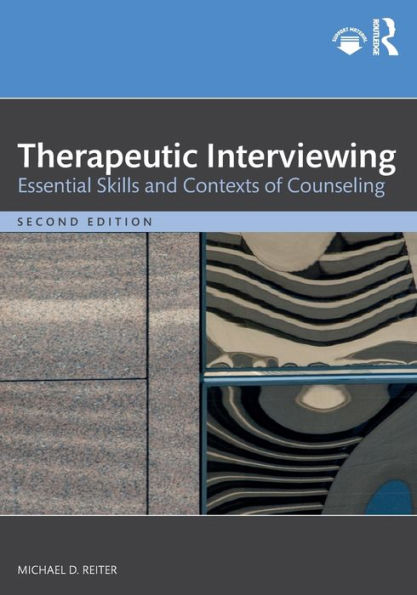Home
Therapeutic Interviewing: Essential Skills and Contexts of Counseling
Barnes and Noble
Loading Inventory...
Therapeutic Interviewing: Essential Skills and Contexts of Counseling
Current price: $180.00

Barnes and Noble
Therapeutic Interviewing: Essential Skills and Contexts of Counseling
Current price: $180.00
Loading Inventory...
Size: Hardcover
*Product information may vary - to confirm product availability, pricing, shipping and return information please contact Barnes and Noble
This newly updated introductory textbook is designed to help students of psychotherapy and counseling at all levels build the foundational strategies, skills, and tools essential for engaging clients in a therapeutic interview, developing a specialist understanding of the varying formats and diverse settings in which these interviews occur.
In this second edition, Michael D. Reiter interweaves a new framework, the Issue Cycle, to help students build, from start to finish, a foundational template for engaging clients regardless of therapeutic model. With every chapter being revised, as well as including a new chapter on the ethical relationship that occurs in psychotherapy, the book begins with laying down the context of therapy, such as its definitions, motivations, and ethics, before moving on to developing students skills of therapy, including conversing, reflecting, goal-setting, terminating sessions, and how to avoid being an ineffective therapist. In Parts 3 and 4, chapters cover the contexts of clients and therapy, such as working with children, families, and groups, and includes a special revised focus on multicultural interviewing and effective online counseling. Including several interactive elements, such as case scenarios and application exercises, an instructor’s manual with a sample syllabus, essay questions and more, students can uniquely see theory in action.
Practical and accessible, this textbook shall be essential reading for students of psychotherapy and counseling, as well as training family therapists, social workers, and other mental health professionals who work directly with those dealing with psychological, behavioral, and emotional difficulties.
In this second edition, Michael D. Reiter interweaves a new framework, the Issue Cycle, to help students build, from start to finish, a foundational template for engaging clients regardless of therapeutic model. With every chapter being revised, as well as including a new chapter on the ethical relationship that occurs in psychotherapy, the book begins with laying down the context of therapy, such as its definitions, motivations, and ethics, before moving on to developing students skills of therapy, including conversing, reflecting, goal-setting, terminating sessions, and how to avoid being an ineffective therapist. In Parts 3 and 4, chapters cover the contexts of clients and therapy, such as working with children, families, and groups, and includes a special revised focus on multicultural interviewing and effective online counseling. Including several interactive elements, such as case scenarios and application exercises, an instructor’s manual with a sample syllabus, essay questions and more, students can uniquely see theory in action.
Practical and accessible, this textbook shall be essential reading for students of psychotherapy and counseling, as well as training family therapists, social workers, and other mental health professionals who work directly with those dealing with psychological, behavioral, and emotional difficulties.
This newly updated introductory textbook is designed to help students of psychotherapy and counseling at all levels build the foundational strategies, skills, and tools essential for engaging clients in a therapeutic interview, developing a specialist understanding of the varying formats and diverse settings in which these interviews occur.
In this second edition, Michael D. Reiter interweaves a new framework, the Issue Cycle, to help students build, from start to finish, a foundational template for engaging clients regardless of therapeutic model. With every chapter being revised, as well as including a new chapter on the ethical relationship that occurs in psychotherapy, the book begins with laying down the context of therapy, such as its definitions, motivations, and ethics, before moving on to developing students skills of therapy, including conversing, reflecting, goal-setting, terminating sessions, and how to avoid being an ineffective therapist. In Parts 3 and 4, chapters cover the contexts of clients and therapy, such as working with children, families, and groups, and includes a special revised focus on multicultural interviewing and effective online counseling. Including several interactive elements, such as case scenarios and application exercises, an instructor’s manual with a sample syllabus, essay questions and more, students can uniquely see theory in action.
Practical and accessible, this textbook shall be essential reading for students of psychotherapy and counseling, as well as training family therapists, social workers, and other mental health professionals who work directly with those dealing with psychological, behavioral, and emotional difficulties.
In this second edition, Michael D. Reiter interweaves a new framework, the Issue Cycle, to help students build, from start to finish, a foundational template for engaging clients regardless of therapeutic model. With every chapter being revised, as well as including a new chapter on the ethical relationship that occurs in psychotherapy, the book begins with laying down the context of therapy, such as its definitions, motivations, and ethics, before moving on to developing students skills of therapy, including conversing, reflecting, goal-setting, terminating sessions, and how to avoid being an ineffective therapist. In Parts 3 and 4, chapters cover the contexts of clients and therapy, such as working with children, families, and groups, and includes a special revised focus on multicultural interviewing and effective online counseling. Including several interactive elements, such as case scenarios and application exercises, an instructor’s manual with a sample syllabus, essay questions and more, students can uniquely see theory in action.
Practical and accessible, this textbook shall be essential reading for students of psychotherapy and counseling, as well as training family therapists, social workers, and other mental health professionals who work directly with those dealing with psychological, behavioral, and emotional difficulties.

















